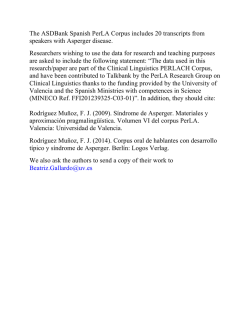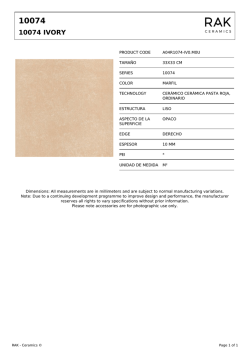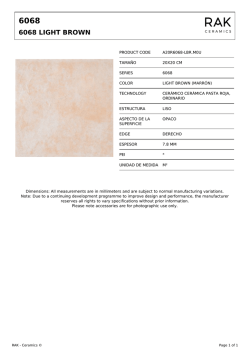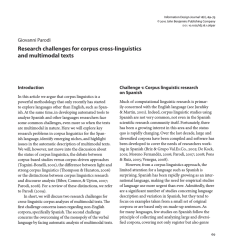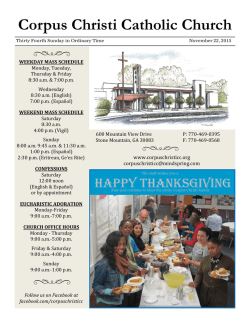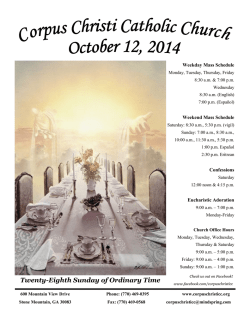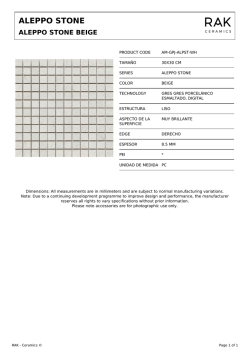
simple y compuesto The simple and compound past in Spanish in
Institut für Anglistik, Amerikanistik und Romanistik simple y compuesto The simple and compound past in Spanish in the colonial period of Hispanoamerica El corpus (CORDIAM) The corpus (CORDIAM) Verbos analizados en el corpus Analyzed verbs of the corpus Method and objectives of the this thesis el corpus CORDIAM ( simple y compuesto ) de la Academia Mexicana de (simple y compuesto ) 12 very frequent Spanish verbs have been selected to be studied with regard to their temporal development and use in the simple and compound past form hispoanoamericanos y el sur y el oeste de E.E.U.U., de aspecto-temporal regiones del continente americano SER to be (natural, permanent characteristics) to be (current state), to be located to go to do to have to come to arrive to go out, to leave to enter, to go in DEJAR to leave, to let LLEVAR to bring, to carry (away) something (from the speaker) TRAER position) ) separados en textos administrativos, se investigan los textos particulares en este trabajo the corpus CORDIAM (Diachronic and Diatopic Corpus of American Spanish) of the Mexican Academy of the Spanish language is used as a basis for a historical perspective on the American Spanish in a time period between 1494 and 1905 Spanish-speaking countries, as well as the Southern and Eastern USA, Jamaica, Haiti and Guyana and which contain chronicles, administrative , juridical and are analyzed in this thesis Graphical illustration of the investigated tenses nuevos materiales (el corpus data del 2015) pueden intimidad nuevas conclusiones sobre el lenguaje contrastive analysis of the simple and compound past in American Spanish based on the corpus CORDIAM in the colonial period (1494-1810) regarding temporal and aspectual characteristics and the continuum of tense and aspect due to the collection and disposability of new material and data by the CORDIAM 2015-corpus, new historical oral texts are available for analysis Graphical illustration of the investigated verbal aspects a) aspecto resultativo/ 1. Past actions with connection to funciones temporales del PC resultado P PC Hechos pasados con referencia al presente/ past actions with reference to the present ahora b) aspecto durativo/ funciones temporales del PS Past actions without connection to the present (SP) PS P pasado (terminado)/ (accomplished) past ahora/ now Past actions with closer relation to the present (SP) PS pasado (continuo)/ (continuing) past c) aspecto reiterativo/ reiterative aspect d) aspecto progresivo/ progressive aspect P ahora/ now proceso progresivo 1492 (inicio de la Conquista de beginning of the conquest of Hispanoamerica) 1810 (Independencia Americana Hispanoamerican independence) investigado time period that has been investigated Main characteristics of the SP Main characteristics of the CP describe acciones puntuales y no repetitivas del pasado ayer, la semana , hace X meses , etc. [h]alle vna carta de vm con la qual reçiui mucho contento en saber tenia salud avnque este contento bino mezclado cumentos donde los individuos particulares describen su propia durante el periodo colonial, el PC muestra mayormente un uso aspectual sus aspectos predominantes: resultativo , durativo y reiterativo: resultativo: l[e] [he] escrito munchas vezes y no [h]e tenido respuesta de ninguna . y [he] estado y estoy sienpre ocupado a estado malo i sangrado quatro beses. vida resultativo oral/coloquial en el medio escrito) describes singular, non-repetitive actions of the past usually expresses actions without connection to the present the main keywords that initiate the use of the SP today were already used during the colonial period (yesterday, last week, last year, X months ago, etc.) a striking result is that the investigated material shows a high letter from Your Mercy which I received with much content hereby knowing that thou art healthy, although this content was impacted explication/reason: the texts consist of private correspondence of individuals describing their daily life many of the authors are not used to writing or have a low education level (oral language use in written documents) Helene Rader Phone: E-Mail: durative aspect ahora/ now Hechos pasados/ past actions pasada / resultative aspect the present (CP) +49 241 80-96377 [email protected] durativo presente reiterativo : crea acciones repetitivas que pueden seguir en el presente during the colonial period, the CP shows a predominant aspectual use, especially: resultative, durative and reiterative: resultative: I have written many times and not received any answer [of any of them]. and I [have] been and I am always busy . reiterative: [..] and (he) has been ill and bleeding four times. a special interest of the investigation is the tense-aspect-continuum: semantic connection between aspect and tense of historical origin Principales aspectos del verbo tratados en el presente trabajo (vista de conjunto) Main verbal aspects analyzed in the present thesis (overview) perfectivo: describe acciones terminadas con incoativo: terminativo: resultativo imperfectivo: describe acciones sin inicio y/o en: continuativo: reiterativo: progresivo perfective: beginning or ending; can be subdivided in: inchoative: initiation of an action terminative: end of an action resultative: result of a previous action imperfective : past actions without beginning or ending; can be subdivided into: continuative: continuation of an action durative: process of the duration of an action reiterative: repetition of one or various actions progressive: process of an action that continues Institut für Anglistik, Amerikanistik und Romanistik Lehr- und Forschungsgebiet Romanische Sprachwissenschaft Kármánstraße 17/19 | 52062 Aachen | GERMANY www.romanistik.rwth-aachen.de Phone: +49 241 80-96119 Fax: +49 241 80-92381
© Copyright 2026
